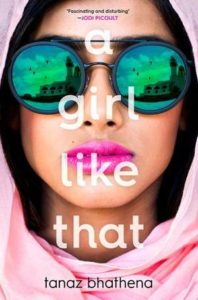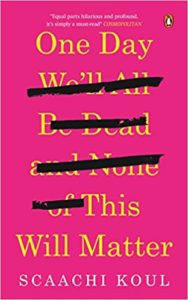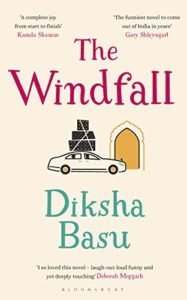‘A Girl Like That’ by Tanaz Bhathena
( My review of Tanaz Bathena’s debut novel A Girl Like That has been published in the Hindu Literary Review on 29 April 2018. Here is the original url. I am c&p the review as well.
For lack of space the review had to be edited so I am reposting the last paragraph about finding a publisher and the literary influences upon her writing.
Tanaz Bathena is a first generation Canadian immigrant who wrote about the South Asian community in Saudi Arabia. This novel grew out of a short story. In an interview, Bathena said it took her five years to find a publisher because she refused to be bracketed with a certain type of south Asian literature that was expected to focus on oppression and cultural conflict. She began writing as she wanted to see more people in literature like herself and especially her Parsi community which remains invisible, thereby raising pertinent questions about South Asian identity and diaspora in world literature. Her fiction addresses this gap. She was deeply inspired by Bapsi Sidhwa, Rohinton Mistry, and Thrity Umrigar. Like other talented writers of south Asian origin, such as Sayantani Dasgupta, Tanuja Desai Hidier, and Sheba Karim, Tanaz Bathena consciously creates fiction for young adults to showcase the diversity of the south Asian diaspora.)
****
Brilliantly told story of a girl as scandalous in death as in life
Tanaz Bhathena’s debut novel A Girl Like That is about a 16-year-old orphan Zarin Wadia, born in Mumbai, now living in Jeddah, with her maternal aunt and uncle, Khorshed and Rustom Wadia. Zarin is considered half-Zorastrian as she is the illegitimate child of Khorshed’s sister. Zarin’s parents die while she is a toddler and she is adopted by the Wadias.
Zarin never considers them her family particularly since her Masi is always hostile towards her. It becomes an excuse for Zarin to turn rebellious — she smokes and prefers the company of boys in school. She is vilified by almost all except by her childhood friend from Mumbai, Porous Dumasia, who reappears in her life after 12 years and remembers her as the girl “of the cautious smiles and shy waves”.
A Girl Like That begins with an accident on the expressway in which both Zarin and Porous are killed. Their souls float above, watching the scene unfold beneath them. The story of the girl who is “as scandalous in death as she has been in life” is told via flashback and the shifting points of view of friends and relatives.
Zarin’s story highlights issues of sexist double standards in a society where women always need to be chaperoned by a male relative while 15-year-old Abdullah, Zarin’s boyfriend, can take decisions on behalf of his 40-year-old mother in his father’s absence. A Girl Like That also raises questions about teenage sexuality and date rape, and the vulnerability of girls in a patriarchal society, where it is unlikely that the woman will be believed if she complains of rape.
Bhathena is a first-generation Canadian immigrant writing about the South Asian community in Saudi Arabia. She began writing because she wanted to see more people like herself — Bhathena belongs to the largely invisible Parsi community — featured in literature, thereby raising questions about South Asian identity and the diaspora in world literature. A Girl Like That does precisely that, and with aplomb.
The writer is an independent international publishing consultant.
A Girl Like That; Tanaz Bhathena, Penguin, ₹399
29 April 2018



